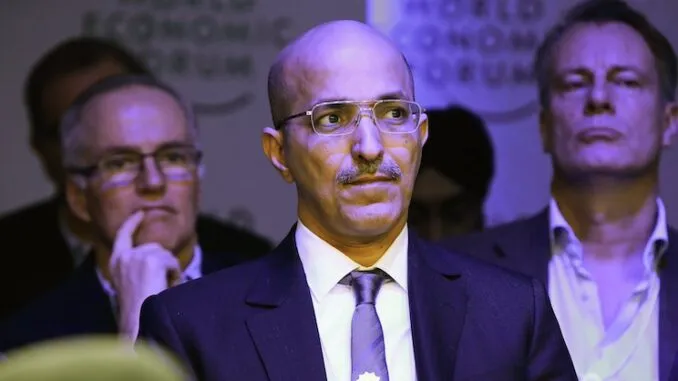by Sean Adl-Tabatabai, The Peoples Voice:
 A World Economic Forum official has called on world leaders to enforce “carbon taxes” before the year 2030, as part of the Great Reset agenda for humanity.
A World Economic Forum official has called on world leaders to enforce “carbon taxes” before the year 2030, as part of the Great Reset agenda for humanity.
During a panel discussion at the 2024 Davos event, Saudi Arabia’s Finance Minister and Young Global Leader Mohammed Al-Jadaan said the time was right to rollout a “globally coordinated system of carbon taxes.”
TRUTH LIVES on at https://sgtreport.tv/
Guerillastocktrading.com reports: One notable aspect of Al-Jadaan’s proposal is the absence of measures targeting corporations that profit from carbon emissions that are also funding members of the WEF. Corporations like Federal Express, United Parcel Service, Amazon, Blackrock, Vanguard, all appear exempt from further taxation in Al-Jadaan’s scheme. Instead, the burden of a global carbon tax would fall squarely on the average citizen.
Impact on Developing Nations
Critics have expressed concerns that implementing international carbon taxes could disproportionately affect poorer and developing nations. They fear that such taxes could hinder industrial growth, spur inflation, and potentially exacerbate existing economic challenges. Al-Jadaan, however, countered this argument, asserting that failing to prevent climate change through international intervention would ultimately harm developing countries the most.
The Proposed Solution
Al-Jadaan proposed a system of carbon taxes combined with subsidies for households in developing nations. Additionally, he advocated for a steady stream of funding to support investments, mitigation, and adaptation efforts in these countries. In his view, this approach represents a fair and realistic solution to addressing climate change while fostering global economic growth.
The Debate Continues
While Al-Jadaan’s proposal seeks to address the pressing issue of climate change, it has generated substantial debate. Critics argue that it places a disproportionate burden on ordinary citizens, potentially without sufficient accountability for corporations. The discussion around international carbon taxes has been gaining momentum in globalist circles, with leaders like French President Emmanuel Macron and Kenyan President William Ruto advocating for a global carbon tax system.
Expanding Carbon Pricing
European Commission President Ursula von der Leyen also voiced support for the expansion of carbon pricing, emphasizing the need to pressure businesses to reduce their carbon footprint. She pointed out that the European Union (EU) has collected significant tax revenueThe income statement provides a summary of a company’s revenue and expenses over a specified period of time, typically a year or a quarter. It shows the company’s total revenue, th… from private companies to fund green policies.
The Ecocide Debate
In addition to the carbon tax discourse, the WEF meeting in Davos witnessed calls for the International Criminal Court to recognize “ecocide” as a crime. This would potentially lead to the punishment of those accused of harming the environment. The discussion surrounding ecocide has implications for various sectors, including agriculture and fishing.
In conclusion, the debate over international carbon taxes remains a contentious and complex issue. While proponents argue that it represents a necessary step to combat climate change, critics raise valid concerns about its potential impact on citizens, corporations, and developing nations.
Read More @ ThePeoplesVoice.tv



